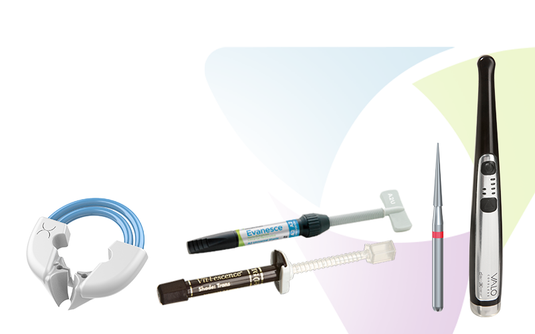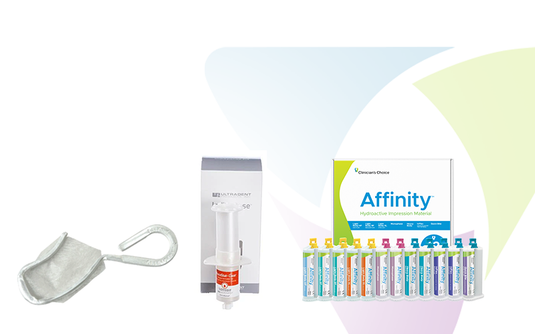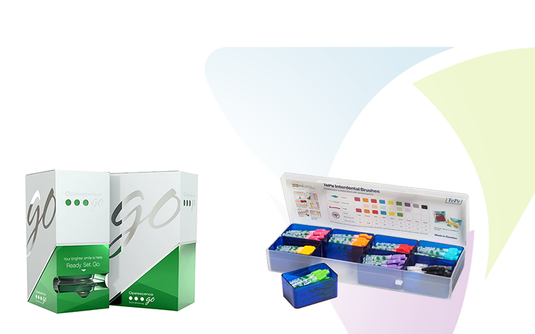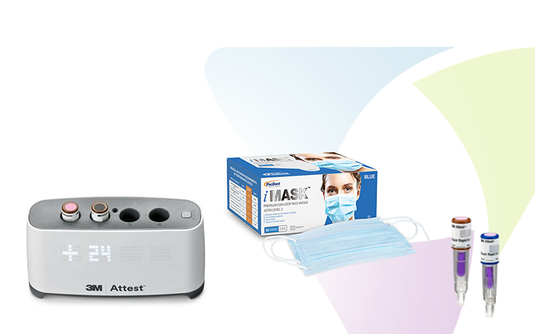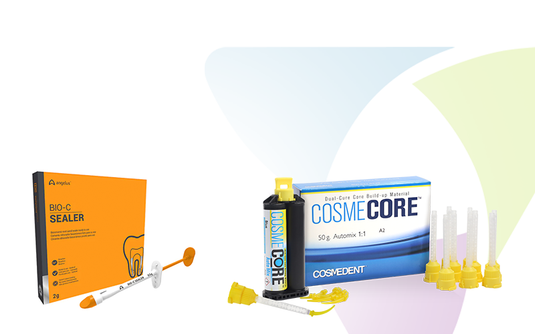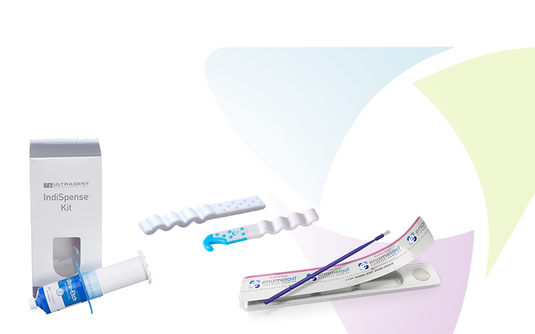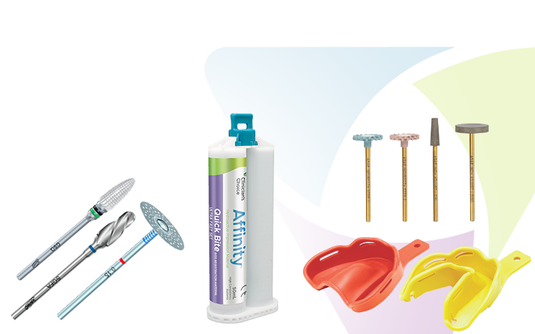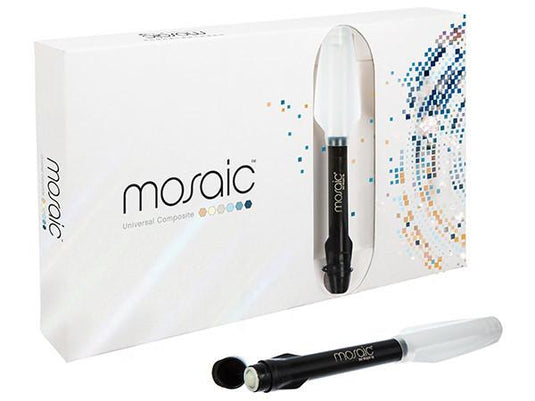
- Product Details
- Clinical Technique
- Technical Details
- Video
- Testimonials
- Configurations
- FAQ
- Resources
Mosaic™ universal composite balances beauty and performance for lasting, lifelike restorations. Mosaic composite can be used for all restorative purposes: basic or complex. Its well-balanced nanohybrid formula produces restorations of the highest quality.
- Handling properties provide total control during manipulation
- Smooth, pliable consistency
- Won’t flow or slump out of place after being shaped
- Ample working time under ambient light
- Doesn’t stick to instruments
- Balanced performance ensures both functional durability and esthetic longevity
- Twenty intuitive shades
- Predictable, natural results
Indications for Use
Mosaic composite is a light-cured, bis-GMA-based universal restorative composite used for both anterior and posterior restorations.



Mosaic Universal Composite Step by Step
– See Instructions for Use for complete instructions, warnings, and precautions.
-
For Class IV restorations, veneers, or diastema closures, we recommend a silicon putty matrix fabricated from diagnostic wax-up.

-
Use the matrix as a guide for the basic shape of the restoration and to support the initial lingual placement of material.
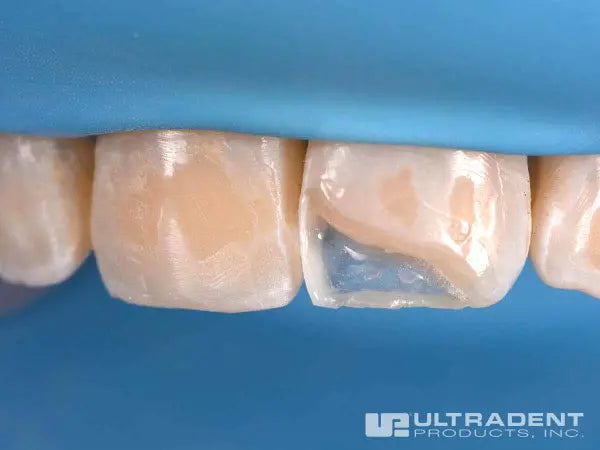
-
Inner dentin body layer includes the basic hue of the exposed dentin. Apply basic hue (A3 shown) and create mamelons using a carver.

-
Cover body and extend enamel edge with appropriate enamel shade (Enamel Neutral shown).

-
Make final adjustments with multifluted finishing burs. Use Jiffy™ composite adjusting and polishing cups, points, and disks for smoothing.

Handling
Mosaic composite feathers to a thin edge without crumbling or tearing. The consistency facilitates complete control and maintenance of detail.
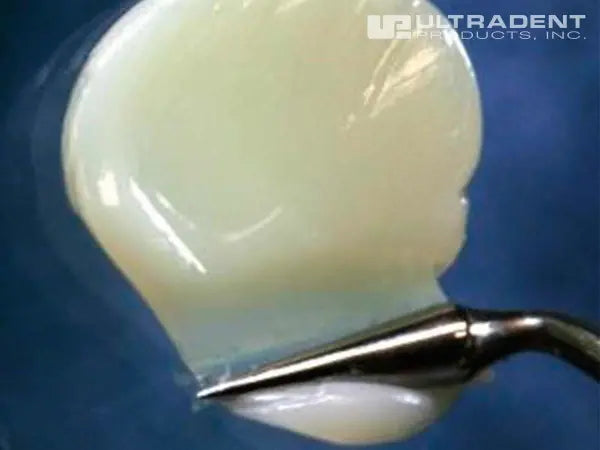

Fluorescence
Mosaic composite’s fluorescence mimics that of natural dentin and enamel.


Gloss Retention
Unlike the competitor, Mosaic composite retains gloss even after 10,000 brushing cycles.


Anterior Restoration
Class IV esthetic restoration using Mosaic composite shades: A4, A3, A2 and A1 from cervical to incisal. Enamel White and Opaque White on the incisal edge. Photos courtesy of Dr. Rafael Beolchi.

Before

After
Posterior Restoration
Class II restoration using the Peak™ Universal Bond adhesive system with Mosaic composite shades A5 and Enamel Neutral. Photos courtesy of Dr. Gaetano Paolone.




Handling
Mosaic universal composite’s consistency is ideally suited for efficiently adapting both anterior and posterior restorations. Once the anatomy of the tooth is formed, the material retains its shape and does not slump.
Strength
Mosaic composite was designed with a balance of fillers and resins to create optimized strength, flexibility, and toughness for both anterior and posterior restorations.

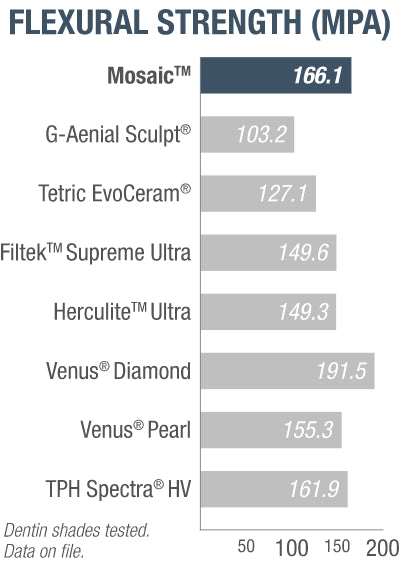

Working Time
The working time for Mosaic composite is between 3:30 and 7:30 depending on the power of the light.
Shade System
Mosaic composite offers 20 shade options to produce predictable, natural results. The slightly translucent dentin shades provide a chameleon effect which enables only a single shade to be used in smaller restorations. The enamel shades give variable opacity to allow the use of a single enamel shade to be used on smaller chips or defects of anterior teeth.

Wear Resistance
Mosaic composite provides wear resistance on par with the natural wear of enamel to create a resistant restoration while not being overly abrasive to opposing dentition.

Gloss Retention
The proprietary dispersion of the nanofillers in Mosaic composite allows for a high polish and long-term gloss retention without sacrificing mechanical properties suited for high stress-bearing restorations. This allows the worn surfaces to produce smaller defects and provide better gloss retention after being subject to abrasion.

Radiopacity
The radiopacity of Mosaic composite is the equivalent of or greater than 2 mm of aluminum in both dentin and enamel shades and can be easily detected on a radiograph.

Delivery
Mosaic universal composite has two dispensing options: a 4 g syringe or a .2 g unit dose compule. A unique and novel KleenSleeve™ protects composite from picking up contamination from the black outer syringe barrel.
The syringe features a unique, innovative design with a smooth contoured handle and barrel to allow for easy cleaning while still being easy to grip and identify.

Mosaic universal composite can be used for all restorative purposes: basic or complex. Its well-balanced nanohybrid formula produces restorations of the highest quality.
This case shows how to combine opaque and translucent Mosaic composite shades to mimic the same optical properties of the surrounding dentition, producing a highly esthetic result.
Various shade combinations of Mosaic Universal Composite are layered to create four results: bleach, young, adult, and senior.
How to create a posterior restoration from prep to polish with Mosaic composite.
Demonstration of optimal handling features using Mosaic Universal Composite: doesn’t pull or tug, doesn’t tear, doesn’t stick to instruments.
"Very nice opaque dentins, beautiful enamel shades, and a great handling. This is what I like in Mosaic!"
Dr. Gaetano Paolone
"Love the way the material handles and I love the realistic and beautiful look…Mosaic composite is a WINNER! Can’t wait to do more cases!"
Dr. Hal Stewart
"I was very impressed with how Mosaic handled. I love the consistency. It was also very easy to place, sculpt, and condense."
Dr. John Flucke
"It holds it shape, it holds its shade value, and the integrity of the material is great."
Dr. Brad Rogers
Syringe Intro Kit (Item Number: 744801):
- 1 x 4g A1 Syringe
- 1 x 4g A2 Syringe
- 1 x 4g A3 Syringe
- 1 x 4g Enamel Neutral Syringe
- 1 x 4g Enamel Translucent Syringe
- 1 x Mosaic Shade Guide
Q: What is the filler composition for Mosaic composite?
A: The details related to filler composition are proprietary; Mosaic composite contains zirconia-silica glass ceramic and 20 nanometer silica. The filler load is 68% by volume for dentin shades and 56% for enamel shades.
Q: What kind of resin is used in Mosaic composite?
A: Mosaic composite is a Bis-GMA-based composite.
Q: Is Mosaic compatible with other bonding systems?
A: Yes, Mosaic composite is methacrylate-based and compatible with other resin bonding systems. For optimal results, we recommend bonding with the Peak™ Adhesive System.
Q: Is it possible to layer Mosaic composite in greater than 2 mm increments?
A: For adequate polymerization, it is important than Mosaic composite is layered in increments of 2 mm or less.
Q: What are the recommended polishing steps?
A: We recommend the Jiffy™ composite finishing line for shaping and polishing. Use the green (coarse), yellow (medium), and then white (fine) Jiffy adjusting and polishing system for quick shaping. The blue (ultrafine) Jiffy™ HiShine™ is an optional polishing step to provide an extra smooth and a highly polished finish. If extra shine is desired, we recommend using the Jiffy™ Goat Hair Brush with Ultradent™ Diamond Polish Mint.
Q: Do the Mosaic Singles require a special dispensing gun?
A: Mosaic Singles can be dispensed using the Ultradent™ Composite Gun or any standard composite dispensing gun.
View the Mosaic Composite Product Sheet.
View the Mosaic Composite Technical Profile.
View the Mosaic Composite Layering Guide Quick Reference.
View the Reality 5-Star #1 Composite Review of Mosaic Composite.
View the Clinical Guide: The Predictability of No-Prep Composite Veneers.
View the Clinical Guide: The Opacity and Translucency Game.
View the Clinical Guide: Restorative Essentials.
View the Clinical Guide: An Esthetic Approach in the Posterior Zone.
View the Clinical Guide: When A Small Incisal Restoration Makes A Big Difference.
View the Mosaic Syringes and Singles IFU.
View the Mosaic SDS (English).

